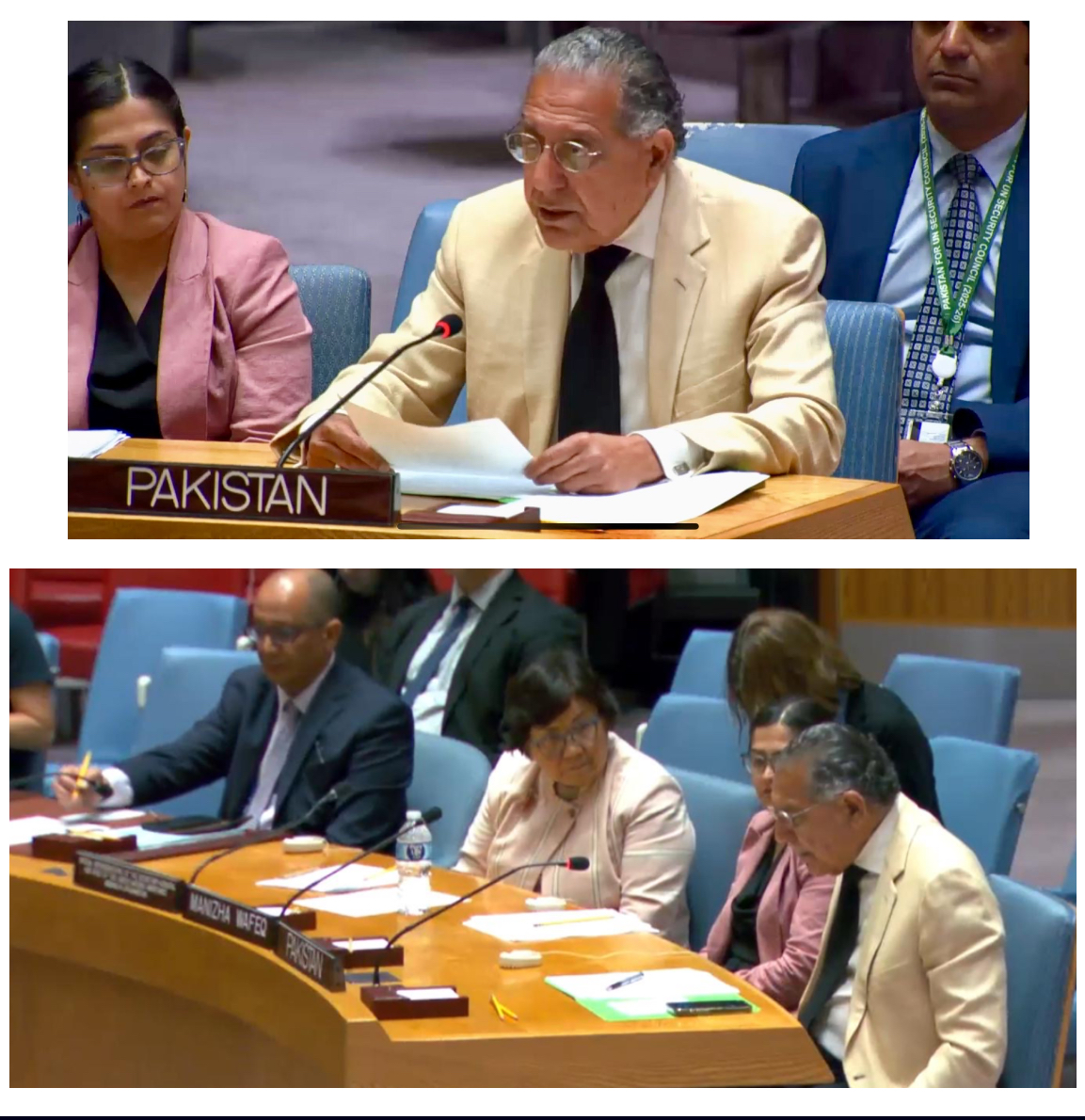 Pakistan has reiterated that the elimination of terrorism within and from Afghanistan remains the highest priority for the international community, Afghanistan neighbours, and Afghanistan itself.
Pakistan has reiterated that the elimination of terrorism within and from Afghanistan remains the highest priority for the international community, Afghanistan neighbours, and Afghanistan itself.
Despite progress made by the Afghan Interim Government (AIG) in combating Daesh (ISKP), several other terrorist groups, including Al-Qaeda, TTP, ETIM, and IMU, continue to operate in Afghanistan.
Pakistan urged the AIG to take effective and sustained action against these groups in compliance with several Security Council resolutions.
During the UN Security Council meeting on Afghanistan today, Ambassador Munir Akram, the Permanent Representative of Pakistan to the UN, highlighted the dangers of allowing impunity for terrorist groups in Afghanistan. He emphasized that goals such as investment, social and economic development, and infrastructure projects cannot be achieved as long as these groups operate freely within and from Afghanistan.
Ambassador Akram described the Tehreek-e-Taliban Pakistan (TTP) as the most direct and serious threat to Pakistan. He detailed the TTP’s terrorist activities, which have resulted in hundreds of civilian and military casualties.
He said the TTP has intensified its attacks, after acquiring sophisticated weapons. Despite Pakistan’s repeated calls for the AIG to take decisive action against the TTP, including halting cross-border attacks, disarming fighters, and handing over terrorists, no significant action has been taken, he said.
He said that the TTP safe havens near Pakistan’s borders persist, and recent cross-border attacks have included one that killed several Chinese engineers working on the Dasu hydropower project.
Ambassador Akram urged the UN Security Council to call on the AIG to sever its links with the TTP and its associates, prevent cross-border attacks against Pakistan, disarm TTP terrorists, and capture and hand over TTP leaders to Pakistan.
Ambassador Munir Akram said that Pakistan continues to advocate for sustained engagement with the Afghan Interim authorities to help normalize the situation in Afghanistan. He said that the AIG’s decision to participate in the Doha meeting at the end of this month represents a critical opportunity for constructive dialogue on all key issues related to Afghanistan.
Ambassador Akram stressed the importance of having clear objectives for both the international community and the AIG. He said that as highlighted by the UN Special Coordinator on Afghanistan, addressing the major issues for normalization requires a realistic roadmap, outlining reciprocal steps by the AIG and the international community towards Afghanistan’s normalization and integration into the global community.
He reminded the international community of its obligation to assist the 23 million Afghans in urgent need of humanitarian aid. Unfortunately, the Afghanistan Humanitarian Needs and Response Plan has only received 16.2% of the necessary $3.06 billion for the targeted 17.3 million Afghans.
Full funding from all possible sources is essential to meet these critical needs, he maintained, he said.
Ambassador Munir Akram also termed the revival of the Afghan economy and finding pathways for sustained development as being equally important, a task which, he said, requires the restoration of the Afghan banking system, commercial activities, and private sector investment. Additionally, creating conditions for the release of Afghanistan’s frozen assets and their transfer to its Central Bank is crucial, he stated.
Ambassador Akram said that planned infrastructure and regional connectivity projects must be initiated and expressed Pakistan’s commitment to expanding trade and economic relations with Afghanistan. He said that in March, Pakistan and the AIG signed a 9-point agreement on trade and transit issues to promote economic relations.
The Pakistan UN Ambassador asked the AIG to take steps to meet its obligations in line with international law and established norms. He said that global concern remains over the restrictions imposed on women and girls in Afghanistan, which do not align with international law or Islamic tenets.
Concluding the statement, Ambassador Akram said that Pakistan enjoys close bonds of ethnicity, history, faith, language, and culture with Afghanistan. Promoting peace, stability, and development in Afghanistan is a national compulsion for Pakistan.
We will continue to work at all levels bilateral, regional, international, and with the UN to achieve these objectives.